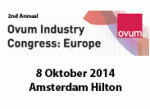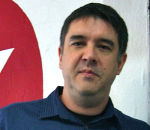Ara Avakian is Senior Manager Technology Solutions at Global Reporting Initiative, and he will be part of the following panel session at Ovum Industry Congress Europe, taking place in Amsterdam on 8 October 2014: To the Cloud and Beyond, alongside Belastingdienst and ONVZ. We asked Ara about his experience and projects, as well as his expectations from the conference. Here’s what he had to say:
 Ara Avakian: At OIC Europe, I am most looking forward to hearing about how to transition to a data-optimized organization that is positioned to smartly capture, manage and capitalize on information. Despite new apps and enterprise systems some organizations still suffer from information silos, this may be due to insufficient buy-in or change management but an absence of easy to use tools may also play a part. I’d like to hear some examples of how organizations are transitioning and what their experiences have been.
Ara Avakian: At OIC Europe, I am most looking forward to hearing about how to transition to a data-optimized organization that is positioned to smartly capture, manage and capitalize on information. Despite new apps and enterprise systems some organizations still suffer from information silos, this may be due to insufficient buy-in or change management but an absence of easy to use tools may also play a part. I’d like to hear some examples of how organizations are transitioning and what their experiences have been.
Ovum: From a learning experience viewpoint, what has been your most valuable lesson in your working career, or your most successful failure?
AA: Over the years I have seen a number of technology projects initiated without first undergoing a rigorous review against organizational priorities. I’ve seen this occur across a variety of industries and with projects including enterprise software, websites and online tools. I’ve learned that projects often get initiated for questionable reasons and that simply because we’ve received earmarked funds or someone in upper management is driving an initiative isn’t enough. It’s clear to me that all projects should be reviewed as part of a formal process with upper management (during budget season) where they can be checked for alignment against organizational strategy and prioritized with a clear cost and realistic schedule. These are minimum requirements and if not met then the initiative should be put on hold until more information becomes available. In some instances it’s correct to push back – as long as one can articulate the reasons in clear business risks to upper management. For my own proposals I’ve found it’s especially important to ask the ‘5-why’s’. Is it strategically aligned? Is it providing value or is it just cool? Can the ROI be quantified? Is it a priority worth the resources, time and budget or are my energies best spent elsewhere?
Ovum: What one thing would you implement tomorrow if you knew you were guaranteed to succeed?

 The second edition of
The second edition of  Rocco Labellarte: I am discussing Migrating to next generation infrastructure – Mountain or molehill? at NGI 2014. I believe it is an opportunity to underline the essential move toward IT being all about enabling business outcomes. IT becomes the toolbox; how businesses use that toolbox to achieve their desired outcomes becomes the more fundamental question.
Rocco Labellarte: I am discussing Migrating to next generation infrastructure – Mountain or molehill? at NGI 2014. I believe it is an opportunity to underline the essential move toward IT being all about enabling business outcomes. IT becomes the toolbox; how businesses use that toolbox to achieve their desired outcomes becomes the more fundamental question. I am discussing Cloud Experiences in the Enterprise at OIC 2014. I believe that the move to the cloud is a vast opportunity that many are still struggling to fully take advantage of. I’m interested in how the experiences of smaller startups like Songkick can inform the practices of larger enterprises, and vice versa.
I am discussing Cloud Experiences in the Enterprise at OIC 2014. I believe that the move to the cloud is a vast opportunity that many are still struggling to fully take advantage of. I’m interested in how the experiences of smaller startups like Songkick can inform the practices of larger enterprises, and vice versa. Laurent Lachal: At OIC, I am most looking forward to interacting with cloud service providers and consumers, especially during one to one analyst clinics that are freely available.
Laurent Lachal: At OIC, I am most looking forward to interacting with cloud service providers and consumers, especially during one to one analyst clinics that are freely available.